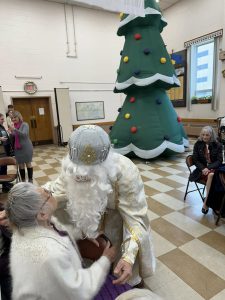
Celebrating the great and holy bishop, St Nicholas.

Celebrating the great and holy bishop, St Nicholas.
Our father among the saints, Nicholas, archbishop of Myra in Lycea, the wonderworker.
There is probably more folklore surrounding St Nicholas than any other saint on the calendar, though actual biographical facts are few. He was bishop in Myra, in what is now Turkey, during the first part of the fourth century. He probably attended the first ecumenical council in Nicea.
Within two centuries of his death, his renown was such that the Emperor Justinian built a church in his honor in Constantinople. In the eleventh century his relics were stolen and taken to Bari in southern Italy, where they remain to this day. A portion, however, was presented to the Greek Church in North America in 1972.
Nicholas was the model pastor: he was a father to orphans and a protector of the oppressed; his openness and generosity to children reflect the gospel image of Christ; and finally his concern for travelers and intervention in the cause of justice are facets of divine love. In the eyes of the Church, every bishop should be an icon of this love. (NS)
Join us for an open house and to celebrate St. Nicholas on December 29. See each of the flyers for information (in Ukrainian and English).
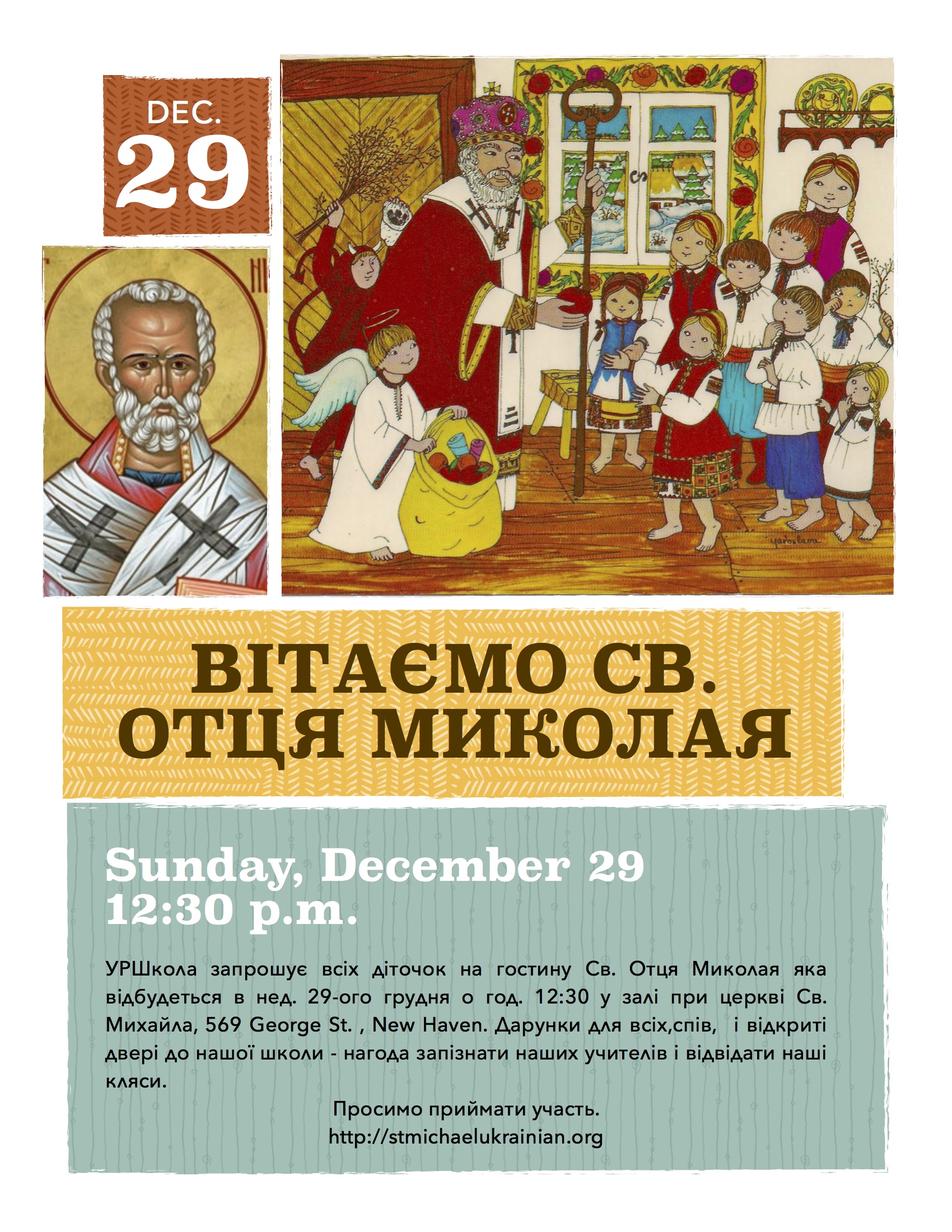
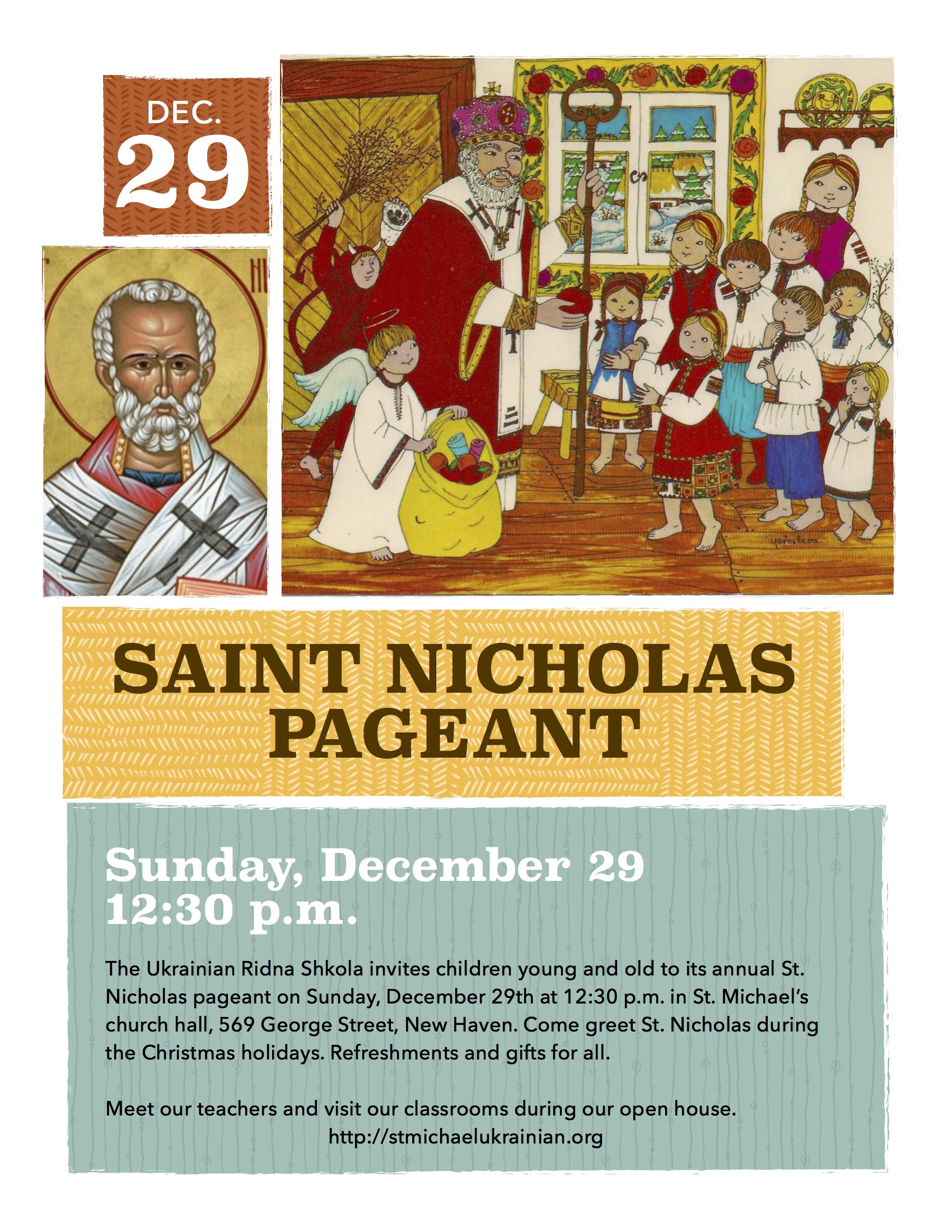
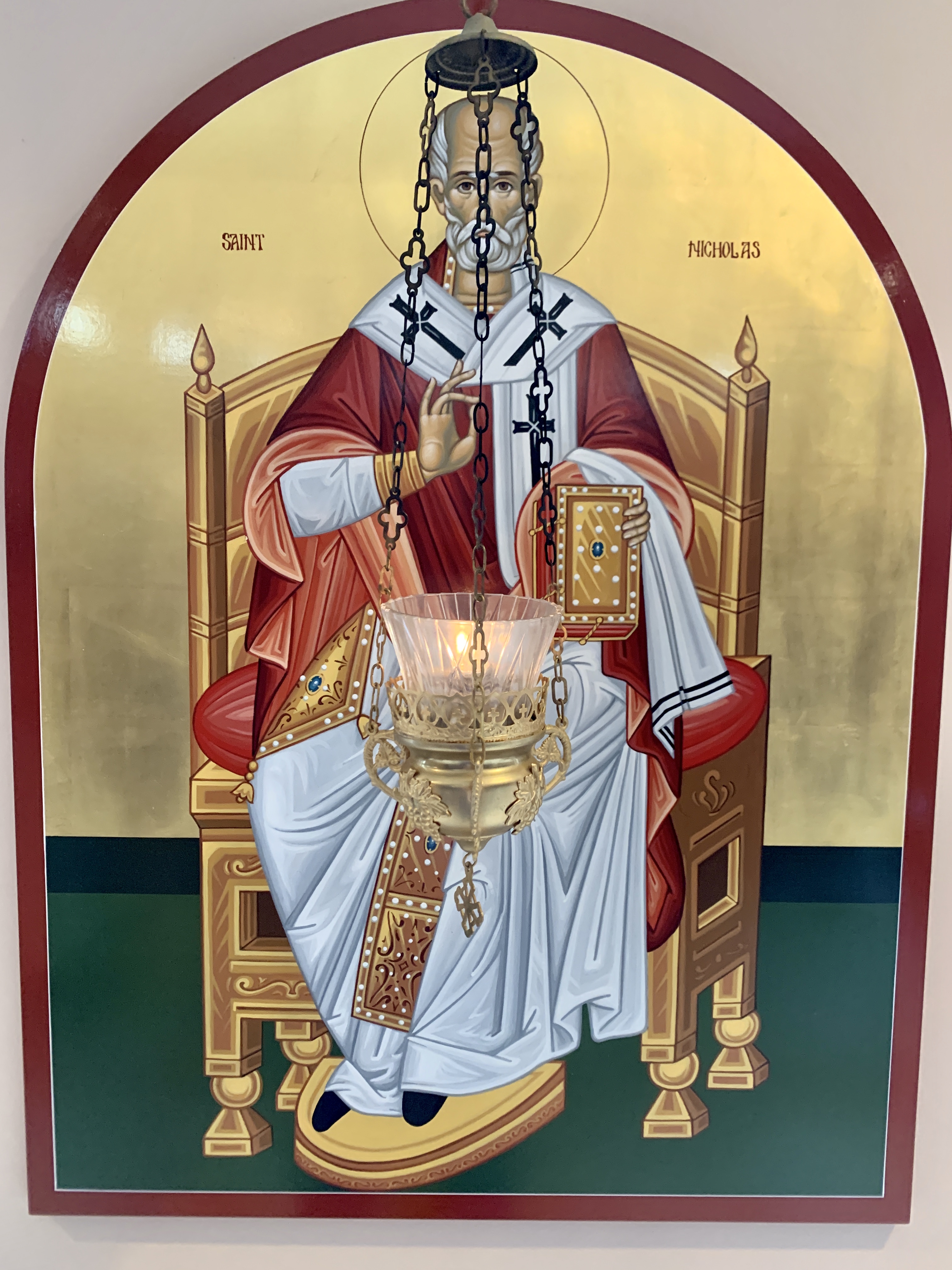 One can easily say that the greatest saint of the Byzantine Church is Nicholas the Wonderworker, Archbishop of Myra in Lycia. Yet the only thing we know of him for certain is his name, and that a holy man named Nicholas was the bishop in Myra in the fourth century. He has become essentially connected with the feast of Christmas. While the details of his life are certainly legendary, the first appearance is the Vita per Michaelem, in the ninth century, and then by Simeon Metaphrastes in the tenth century, yet we cannot help but suspect that there is a tradition of the goodness of his character that prompted such stories. He is the a golden example of all that is good in a true Christian, following the Lord in love for the poor, in joy of salvation, and in greatness of heart. Where, then, the stories written to fit his character. Certainly, the human race is hungry for such a saint, explaining his embrace by Greece and Russia as their patron saint. He gave a dowry to the poor girls, he saved sailors from storms, he obtained the liberation of those falsely accused. When his body was taken from Myra to Bari, the goodness of his life made him a favored saint throughout all the West.
One can easily say that the greatest saint of the Byzantine Church is Nicholas the Wonderworker, Archbishop of Myra in Lycia. Yet the only thing we know of him for certain is his name, and that a holy man named Nicholas was the bishop in Myra in the fourth century. He has become essentially connected with the feast of Christmas. While the details of his life are certainly legendary, the first appearance is the Vita per Michaelem, in the ninth century, and then by Simeon Metaphrastes in the tenth century, yet we cannot help but suspect that there is a tradition of the goodness of his character that prompted such stories. He is the a golden example of all that is good in a true Christian, following the Lord in love for the poor, in joy of salvation, and in greatness of heart. Where, then, the stories written to fit his character. Certainly, the human race is hungry for such a saint, explaining his embrace by Greece and Russia as their patron saint. He gave a dowry to the poor girls, he saved sailors from storms, he obtained the liberation of those falsely accused. When his body was taken from Myra to Bari, the goodness of his life made him a favored saint throughout all the West.
In the West, he has become secularized as “Santa Claus,” (possibly from early Dutch settlers, who would have known him “Sinterklass”). A poem by Thomas Nast in 1823, has been influential in the legend that he lives at the North Pole, and distributes toys to children on Christmas eve or early Christmas morning. This image, unfortunately, has sometimes been commercialized to sell products to be given as gifts.
As Christians, we surely recognize him as a saint, a bishop in Christ’s body, the Church. Perhaps from the visit of the Magi, giving gifts, and the legend of his life, of giving gold as a dowry have connected him with gift-giving. Gift-giving can be a sign of Christian love, as our Lord taught, as related by St. Paul: “Keep in mind the words of the Lord Jesus who himself said, ‘It is more blessed to give than to receive.’” (Acts 10:35) In giving gifts, we, together with the Magi, recognize the image of Christ in all people. In imitating the saints, we are brought closer to Christ. Is it not true, then, that on our Holy Father Nicholas and in the secularized Santa Claus, we see the same virtues: joy in life, generosity, love for all people, sincerity and truthfulness? Do we not also see in our Holy Father Nicholas and in the secular Santa Claus, the ability to perform wonders?
You are invited to attend the St. Nicholas Play to be held on Sunday, December 23, 2018, 12 noon, in the church hall.
We worship first, and the play follows the Divine Liturgy.
The Ukrainian Ridna Skhola (School) students will be performing at this traditional event. St. Nicholas will make a presentation for all the good children.
Please support the school and bring your children/grandchildren to this event. This is a great opportunity to learn an aspect of our Faith and share life in community. We also need an audience!
(Parents can bring gifts to the kitchen for distribution later by St. Nicholas. It’s a secret for the children.)
We are a small school presently, but we are still keeping traditions.
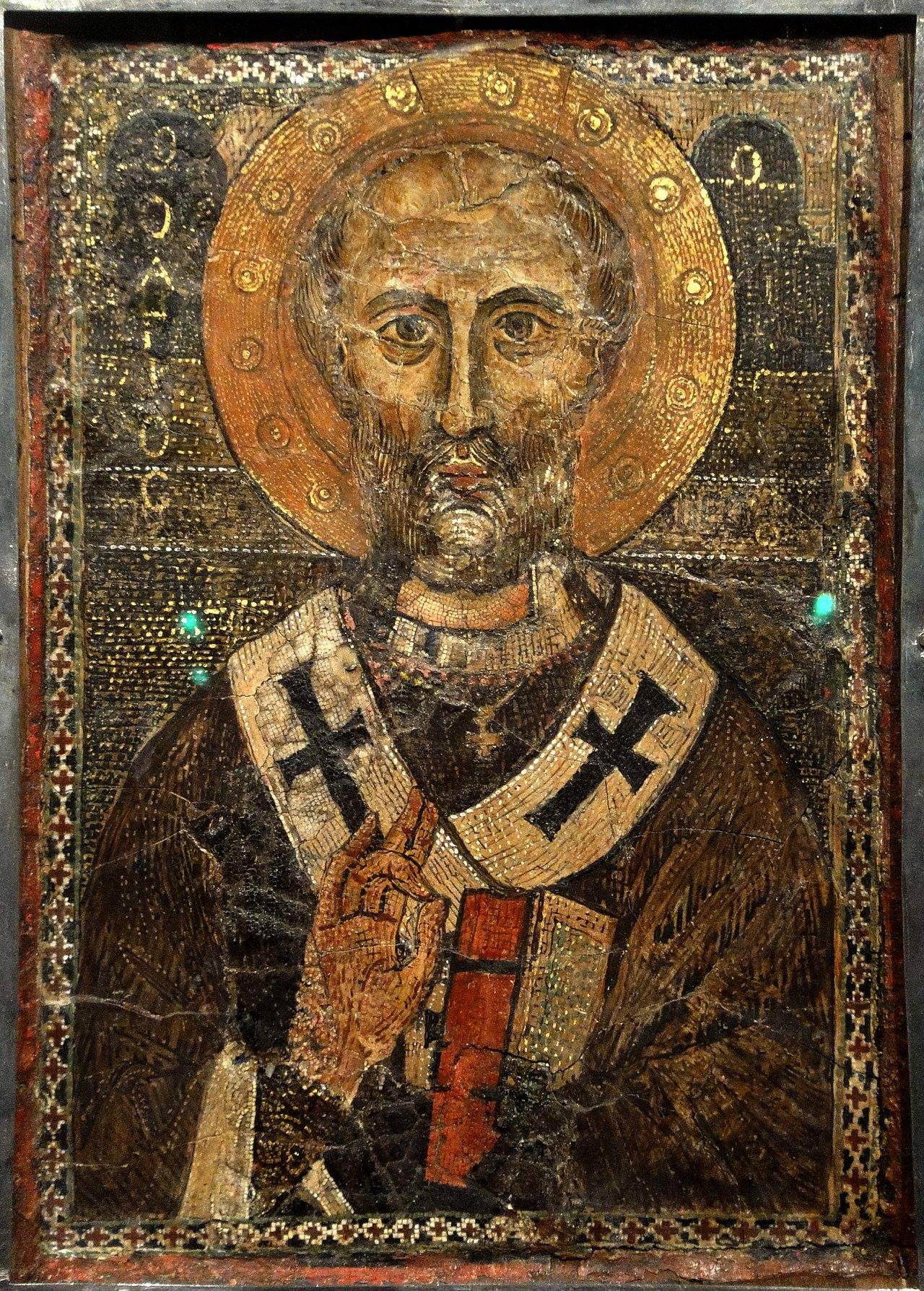
Blessed feast day of St. Nicholas!
Thy just works have shown Thee to thy flock as an example of faith, an image of meekness and a teacher of abstinence. By humility Thou didst achieve exaltation, and by meekness, riches. O Father Bishop Nicholas, intercede with Christ our God to save our souls.
(Troparion for St. Nicholas)
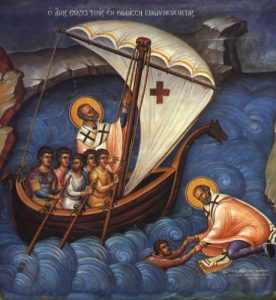 Saint Nicholas the Wonderworker
Saint Nicholas the Wonderworker
(Troparion, Tone 4):
“In truth you were revealed to your flock as a rule of faith, an image of humility and a teacher of abstinence; your humility exalted you; your poverty enriched you. Hierarch Father Nicholas, entreat Christ our God that our souls may be saved.”